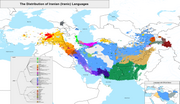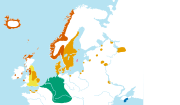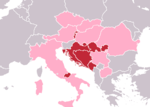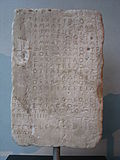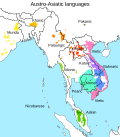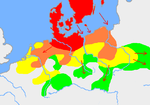Isogloss (redirect from Isoglosses)
meaning of a word, or the use of some morphological or syntactic feature. Isoglosses are a subject of study in dialectology, in which they demarcate the differences...
10 KB (1,092 words) - 08:03, 10 July 2024
Thamudic D, Safaitic, and Hismaic are attested. The last two share important isoglosses with later forms of Arabic, leading scholars to theorize that Safaitic...
150 KB (14,161 words) - 00:40, 25 December 2024
The ⟨h⟩ is only pronounced in the north-east, as the isoglosses here show....
105 KB (11,399 words) - 22:47, 20 December 2024
by several centuries. In phonology, the Romani language shares several isoglosses with the Central branch of Indo-Aryan languages, especially in the realization...
216 KB (20,543 words) - 13:59, 30 December 2024
(23 August 2016). "Zero vs. oh: Strategies of glyph differentiation". Isoglosse. Retrieved 12 September 2016. "Registered features - definitions and implementations"...
10 KB (1,013 words) - 23:08, 26 March 2023
geographical area; the centum–satem isogloss intersects a number of other isoglosses that mark distinctions between features in the early IE branches. It may...
112 KB (10,268 words) - 21:03, 2 January 2025
Dutch, it has historically been spoken north of the Benrath and Uerdingen isoglosses, while forms of High German (of which Standard German is a standardized...
116 KB (8,400 words) - 18:34, 1 January 2025
since they share a number of phonological, morphological and lexical isoglosses, with some being exclusive between them. Scholars have proposed a Graeco-Phrygian...
70 KB (7,161 words) - 23:44, 2 January 2025
Iranian languages (section Isoglosses)
The Iranian languages, also called the Iranic languages, are a branch of the Indo-Iranian languages in the Indo-European language family that are spoken...
49 KB (3,647 words) - 20:17, 1 January 2025
Uralic languages (section Lexical isoglosses)
proposed tree, more divergent from the standard, focusing on consonant isoglosses (which does not consider the position of the Samoyedic languages) is presented...
89 KB (7,617 words) - 12:39, 28 December 2024
that spread more evenly over the East Norse area), creating a series of isoglosses going from Zealand to Svealand. In Old Danish, /hɾ/ merged with /ɾ/ during...
112 KB (8,843 words) - 05:56, 12 December 2024
morphological and syntactical isoglosses are much fewer in number. Sussex & Cubberly (2006:43–44) list the following phonological isoglosses: Merger of yers into...
42 KB (4,000 words) - 12:03, 29 November 2024
of various mixtures of Chakavian with Ekavian, Ijekavian and Ikavian isoglosses. The most standardised form (Kajkavian–Ikavian) became the cultivated...
50 KB (4,703 words) - 03:14, 28 December 2024
the ideas of P. Tedesco (1921: 255) and regarding the common phonetic isoglosses shared by Kurdish, Persian, and Baluchi, Mackenzie concluded that the...
41 KB (3,825 words) - 00:27, 24 December 2024
Balto-Slavic stage in which it developed numerous lexical and morphophonological isoglosses with the Baltic languages. In the framework of the Kurgan hypothesis,...
107 KB (9,261 words) - 12:54, 24 December 2024
as some phonological differences compared with Standard Spanish. The isoglosses that mark the borders of Andalusian Spanish overlap to form a network...
208 KB (21,207 words) - 02:05, 13 December 2024
Niger–Congo family). Lionel Bender (1980) proposes several Eastern Sudanic isoglosses (defining words), such as *kutuk "mouth", *(ko)TVS-(Vg) "three", and *ku-lug-ut...
17 KB (922 words) - 21:35, 15 June 2024
linguists with Germanic and Balto-Slavic, all of which share a number of isoglosses with Albanian. Other linguists linked the Albanian language with Latin...
179 KB (17,162 words) - 13:40, 1 January 2025
significant, but which are not reflected in the usual orthography. A series of isoglosses crosscuts the main dialects. The modern reflexes of the long Common Slavic...
144 KB (13,988 words) - 21:07, 29 November 2024
suggest that ancient Macedonian was a Northwest Doric dialect, which shares isoglosses with its neighboring Thessalian dialects spoken in northeastern Thessaly...
48 KB (5,258 words) - 20:20, 27 December 2024
been proposed as an alternative to the tree model. The wave model uses isoglosses to group language varieties; unlike in the tree model, these groups can...
35 KB (4,141 words) - 10:06, 25 November 2024
Romance languages: 17 cognates with Gallo-Romance, 5 isoglosses with Iberian Romance, 3 isoglosses with Occitan, and 1 unique word. Gloss Catalan Occitan...
164 KB (11,943 words) - 08:19, 30 December 2024
unevenly from Denmark, creating a series of minor dialectal boundaries, or isoglosses, ranging from Zealand in the south to Norrland, Österbotten and northwestern...
81 KB (8,524 words) - 02:10, 4 December 2024
any case, Coventry sits right at a dialectal crossroads, very close to isoglosses that generally delineate 'Northern' and 'Southern' dialects, exhibiting...
197 KB (18,752 words) - 21:13, 24 December 2024
and non-exclusive lexical, morphological, phonological and accentual isoglosses in common with the Slavic languages, which represent their closest living...
114 KB (10,262 words) - 20:36, 7 December 2024
Skopska Crna Gora along the rivers Vardar and Crna. There are numerous isoglosses between these dialectal variations, with structural differences in phonetics...
104 KB (10,360 words) - 23:35, 2 January 2025
3285465. S2CID 171874630. Trumper, John (2018). "Some Celto-Albanian isoglosses and their implications". In Grimaldi, Mirko; Lai, Rosangela; Franco, Ludovico;...
64 KB (5,892 words) - 22:53, 2 January 2025
of Median" (cf. Rossi, 2010: 307–8). Likewise, in his survey of major isoglosses in the historical phonology of West Iranian languages, Windfuhr (1975:...
70 KB (9,140 words) - 09:11, 2 January 2025
Katuic languages (section Lexical isoglosses)
Proto-Austroasiatic forms. Sidwell (2015:173) lists the following lexical isoglosses shared between Katuic and Bahnaric. Furthermore, Gerard Diffloth (1992)...
16 KB (1,424 words) - 03:16, 4 November 2024
by chance, Gothic and Old Norse ended up with the same ending. Other isoglosses have led scholars to propose an early split between East and Northwest...
91 KB (10,158 words) - 05:06, 28 December 2024









